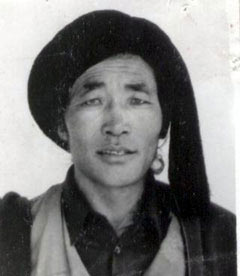
Runggye Adak
Security has been stepped up in the area with large numbers of armed police said to be present in the town of Lithang (Chinese: Litang) in Kardze (Chinese: Ganzi) Tibetan Autonomous Prefecture. Most of the Tibetan nomads and local people from Runggye Adak’s home area who had been gathered outside the county authorities’ office are said to have dispersed, although some have said they will return if 53-year old Runggye Adak, a father of 11 children and an respected figure in his nomadic community, is treated unfairly. Following Runggye Adak’s detention, approximately 200 Tibetans gathered in the courtyard of Lithang police station to appeal for his release while several Tibetans went inside to talk to police and Kardze officials.
According to information received by ICT, several weeks earlier, the Chinese authorities circulated a petition at Lithang monastery for monks to sign saying that they did not want the Dalai Lama to return to Tibet. A Tibetan who visited the area and spoke to monks told ICT: ‘It seems that most of the local population knew about this petition being circulated by officials, and it caused an increase in tension and anxiety. People in this area revere His Holiness the Dalai Lama, and Runggye Adak’s action could have been a response to this provocative move by officials. Local people may have somehow wanted to demonstrate that this petition is a lie, and did not represent the wishes of Tibetans in Lithang.’
ICT has received reports that monks at other monasteries in the area have been confronted with the requirement to sign the petition, which has led to resentment in the monastic community. The authorities have also convened meetings for officials and cadres at work-places in Kardze, where cadres have been required to sign a document saying that they do not share the views expressed during the incident in Lithang, and that they should not spread false information about it.
Runggye Adak went up to the stage just before an official function for the annual horse race, a major festival that attracts thousands of people. According to several reports, once onstage he offered a khatag (Tibetan greeting scarf) to the head of the Lithang monastery, Lithang Kyabgon, and then took the microphone and began to speak. The senior lama is apparently now under close surveillance by the authorities. Runggye Adak said that the Dalai Lama should return to Tibet, and called for the freedom of the Panchen Lama, Gendun Choekyi Nyima (currently in Chinese custody) and Tenzin Deleg Rinpoche, a senior and respected lama from the area who is serving a life sentence for ‘splittism’, after the authorities brought charges of bombing offences against him, which are widely regarded as groundless. According to different sources, Runggye Adak also referred to Tibet’s independent status, stressed that the people of Lithang should have freedom of religious belief, and called for local Tibetans to stop fighting among themselves about land and water issues – a reference to fights that have broken out among Tibetan nomads, often following the division of their land by the authorities in accordance with Beijing’s directives.
According to one source, when Runggye Adak was taken offstage by the police, a group of Tibetans tried to negotiate with them, insisting that he hadn’t said anything that was against the law, and only wanted to improve the people’s situation in Lithang. Throughout the dialogue between Tibetans, officials and police over the past week following the incident, a non-violent approach has been emphasized by Tibetans involved.
Since the incident a week ago, it has become increasingly dangerous for Tibetans to speak about the situation due to increased security in the area and the authorities’ attempts to prevent news about the unrest reaching the outside world.
John Ackerly, President of the International Campaign for Tibet, said today: ‘As well as his loyalty to the Dalai Lama, Runggye Adak was expressing the very real concerns and despair that exist among Tibetans as a result of China’s policies. All over Tibet, nomads are being forced to give up their traditional lifestyle and are losing their land. At the same time, the authorities are stepping up their rhetoric against the Dalai Lama in an attempt to undermine Tibetans’ loyalty to him. It is in China’s interests to address these issues rather than clamping down on the Tibetan people once again.’

